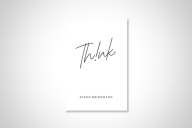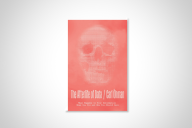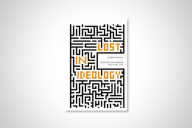You have /5 articles left.
Sign up for a free account or log in.
The news of Saul Bellow's death sent me to the bookshelves, in search of (among other things) a set of interviews about his life and work that he gave 15 years ago. His answers were eloquent and cranky, occasionally at the same time; and taken all together, they form a major exhibit in what is now, for better or worse, the Saul Bellow Memorial Wing of my own literary education.
Another major exhibit in the hall is devoted to the valise stuffed with the unsent letters of professor Moses Herzog -- who, half-crazed by divorce and midlife disintegration, writes to the famous and the brilliant, demanding answers. ("Dear Professor Heidegger, I would like to know what you mean by the expression 'the fall into the quotidian.' When did this fall occur? Where were we standing when it happened?") If Moses Herzog were a real person and alive today, he might be writing for the Valve.
The interviews with Bellow can be found in It All Adds Up, along with various essays and lectures. One exchange in particular left a big impression on first reading, and has served as a kind of touchstone, ever since.
Discussing his time as a student of anthropology at the University of Chicago in the 1930s, Bellow mentions his growing disappointment with the field -- his skepticism about the idea that ethnography really yielded the objective knowledge that its practitioners claimed. (The discipline eventually caught up with his doubts, of course; now it seems incapable, at times, of talking about anything else.)
The anthropologists whose work he was reading left Bellow certain that they couldn't grasp anything important about what they had seen in the field. "To me they were suspect in part because they had no literary abilities," said Bellow. "They wrote books, but they were not real writers. They were deficient in trained sensibilities. They brought what they called 'science' into human matters, matters of human judgment, but their 'science' could never replace a trained sensibility."
The interviewer suggests that a "trained sensibility" is not something you can set out to acquire. Which is, come to think of it, actually a rather paradoxical thing to say. (If you don't have the training, you are condemned to clueless mediocrity. And if you do want it, you are right out of luck.)
Bellow himself doesn't really agree with the interviewer's statement. And in his response, he makes a statement that has bothered me (irritated, stimulated, worried, and shamed me) ever since.
The "trained sensibility," he says, is unavailable "unless you take certain masterpieces into yourself as if they were communion wafers.... If you don't give literature a decisive part to play in your existence, then you haven't got anything but a show of culture. It has no reality whatever. It's an acceptable challenge to internalize all of these great things, all of this marvelous poetry. When you've done that, you've been shaped from within by these books and these writers."
You could be sardonic about it. You could think, "What's a famous Jewish novelist doing, invoking the Eucharist as metaphor? And with no irony, even?" Or you could remember that, in 1988, Bellow had made a bitter jab at multiculturalism, asking who the Tolstoy of the Zulus might have been. (Well, I did say he was cranky.) For that matter, Bellow made plenty of other irritable gestures disguised as grand pronouncements, or maybe it was vice versa. Someone once suggested that Alan Bloom was actually a persona that Bellow had created, so that The Closing of the American Mind (to which the novelist contributed an introduction) could be read as one of his more elaborately constructed works of satirical fiction.
But no effort to dismiss Bellow's comment really worked for me. It stuck in my mind like a burr: "If you don't give literature a decisive part to play in your existence, then you haven't got anything but a show of culture. It has no reality whatever."
I had just spent most of the 1980s reading at least as much critical theory as actual literature. Having left academic life in order to write, I was beginning to have second thoughts about just how appropriate that ratio of effort had been. It wasn't just the trade-off -- the sense in which deciding to read Anti-Oedipus had meant not reading The Magic Mountain. There was still time to read Thomas Mann. After all, Anti-Oedipus had its moments, too.
No, the problem went deeper. Bellow's comment dug all the way down to where certain doubts had settled in.
The outlook expressed in his remark about giving literature "a decisive part to play in your existence" was profoundly antithetical to the spirit of contemporary literary scholarship -- a spirit that had become, for me anyway, second nature.
The basic relationship now prevailing between theory to literature is comparable to the one that exists between a decontamination suit and a potential source of biohazardous materials. You learn to practice the hermeneutics of suspicion as if your life and well-being depended on it.
The idea that you should "take certain masterpieces into yourself as if they were communion wafers" would tend to be, let's say, counterindicated -- albeit on toxicological, not theological, grounds. The very category of "masterpiece" is suspect. (It's got "master" in it, right? That should tell you something.) The "trained sensibility" is a power tool of the epistemic regime of power-knowledge. Etcetra, etcetra, ad nauseam, ad infinitum.
Such are the clichés of academic theory-speak. And such, too, are the clichés about theory, which can be readily assented to by people with no knowledge of the field whatsoever.
That the caricature so closely matches the features of the profession is, in some ways, an unfortunate thing. It keeps all parties involved from seeing just how bored and unhappy almost everyone involved really is. You see it at the annual convention of the Modern Language Association, where the rare moments of excitement seem to come from the effort to pass resolutions on political matters. (This is a process offering all the thrill and efficacy of a really heated student council meeting.)
It is an anxious kind of low-grade misery. Much of the anxiety is economic. Perhaps all of it is -- if only in the sense that economic realities leave their mark on every level of literary study, including what people decided to make a priority in their research and writing.
The constant (and to that degree unreflective) pressure towards the "professionalization" of young scholars barely out of adolescence does not exactly place great emphasis on literature as a force for spiritual bildung -- not that you would find many people willing to use such terms in the first place. In any case, it is probably much easier to appreciate the beauties of a trained sensibility when you are a best-selling novelist whose dust jacket mentions "a Nobel and a Pulitzer, among other awards."
So the point here is not to use Saul Bellow's death as an occasion to lash out at the meathead professors by adopting that faux "defense of high culture" tone available to anyone who wants to use it. (It's hard enough to get beyond the historical reenactments of the Culture and Theory Wars as it is.)
But I do wonder if others, of similar background, have not had something akin to the experience of being shaken by Bellow's remarks about giving literature "a decisive part to play in your existence." (Not your career. Your existence. There is a difference.)
Or if, at some moment when they least expected it, the analytic habit shut down, just for a moment -- leaving them with the sense that the poem (or novel, or whatever) was no longer an object in the world needing to be studied, but rather something alive, something in the mind and for good, effectively becoming part of the world inside one's own skin.
And if not, a question: Why is the profession of literary study what you are doing with your life?








